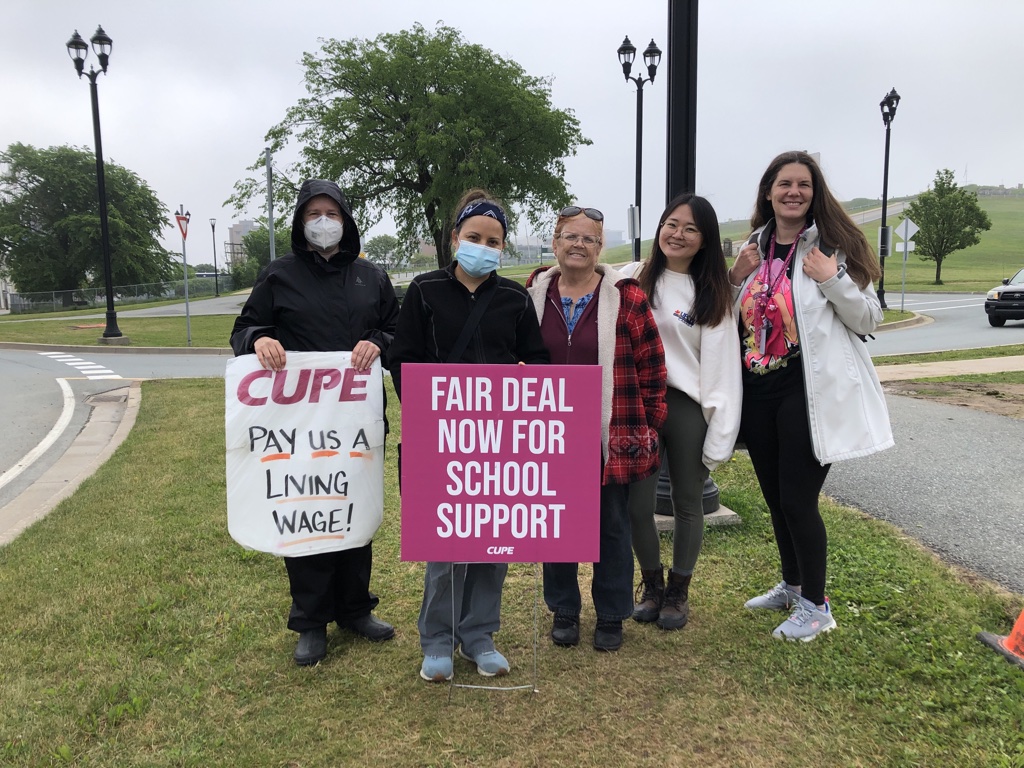Striking school support workers in Nova Scotia are cautiously optimistic a new deal could be struck so they can get back into classrooms.

Their union has reached a tentative agreement with the Halifax Regional Centre for Education (HRCE). Depending on how workers vote, they could return to school as soon as Monday.
That means the once bustling picket lines that were filled with workers and their supporters are winding down as the staff get ready to vote on a new agreement.
After being out of class for more than a month, an educational program assistant (EPA) who has worked at Citadel High School for 15 years says emotions are mixed.
“I am feeling somewhat optimistic,” says Linda Dunn-Colley. “I feel that the government still does not respect our job and what we do, but I do believe the bargaining committee did the best that they could do.”
A tentative agreement between CUPE Local 5047 and the HRCE was announced on Wednesday. Now more than 1,800 employees, including EPAs, Early Childhood Educators, and librarians, will spend the weekend voting on it.
“I am totally looking forward to Monday morning, if this passes, to go meet my kids off the bus,” says Dunn-Colley. “It’s the one thing bringing a smile to my face.”
The province’s labour relations minister says the agreement has been fully endorsed by CUPE leadership.
“I know parents would love to have their children back in school and I know we as parents would too,” says Allan MacMaster. “But we must wait and give them a chance to look at the deal.”

Get breaking National news
In a statement on Wednesday, CUPE Local 5047 President Chris Melanson said reaching the agreement was “made possible by the fierce determination of school support staff in the HRM.”

The strike began on May 10, after the workers voted not to ratify a tentative agreement reached with the province.
The union was seeking wage increases greater than what the government proposed, which was 6.5 per cent over a three-year contract.
Premier Tim Houston says the job action has been felt by the thousands of students who have not been able to go to school.
“To see the impact the strike has had on families is painful for sure,” says Houston. “We, of course, never wanted it to come to that — that’s why we negotiated in good faith with CUPE that tentative agreement before the strike, which was accepted by seven of eight bargaining units and 64 per cent of CUPE members.”
He says the local group chose to take the strike action, which is in their right to do.
Teacher, parent speaks out about strike’s impact
Meghan O’Neill has been a teacher with the Halifax Regional Centre for Education for 22 years. She says the absence of the school support workers is being felt deeply.
“We are desperately missing our educational support workers,” O’Neill says. “They are very much part of our school family and our school community. Our students are really missing out with their absence.”
O’Neill’s also a parent. Her young daughter has profound autism and has not been allowed to attend school during the strike.
“Online learning is not happening for Lauren,” she says. “Neither is going in for half an hour to two hours a day, with a temporary worker or with either her father or myself. So she has been at home without service for five and a half weeks in her final year — her graduating year, I should say, of high school.”
She says a fair deal and a return to class before the end of Lauren’s Grade 12 year would make a difference.
Her daughter can stay in school up to the age of 21.
“Her routine would be back in place,” O’Neill explains. “She would be learning again. She would be seeing so many members of her school community that bring her great joy. And I think most importantly, her sense of belonging.”
She would also be able to spend time with her graduating peers and teachers before the school year ends.
O’Neill says as an educator and a parent she views the absence of students who require the aid of support workers as a human rights violation.
“I think it’s really important to have students who have been excluded back in school where they belong,” she explains. “It’s is part of the inclusive education policy, and that is where they need to be.”
The workers say that even if a new deal is struck, the job action could return as the collective agreement is set to expire in March 2024.
“If we keep the momentum, and more importantly, if we keep the parents’ support,” says Dunn-Colley, “I think we’ll do better next round.”
- Khamenei’s death met with ‘jubilation’ among Iranian-Canadians: Liberal MP
- Iran begins search for new leader; U.S. military says 3 service members killed
- ‘At first I cried’: How Iranian Canadians are reacting to the U.S. strikes in Iran
- Queen’s University students stranded in Doha after Iran attack shuts down airspace










Comments
Want to discuss? Please read our Commenting Policy first.